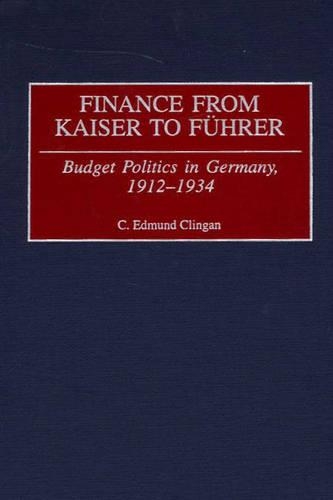
Finance from Kaiser to Fuhrer: Budget Politics in Germany, 1912-1934
(Hardback)
Publishing Details
Finance from Kaiser to Fuhrer: Budget Politics in Germany, 1912-1934
By (Author) C. Edmund Clingan
Bloomsbury Publishing PLC
Praeger Publishers Inc
30th November 2000
United States
Classifications
Tertiary Education
Non Fiction
First World War
Public finance and taxation
Second World War
Modern warfare
Economic history
Political economy
336.43
Physical Properties
Hardback
272
Width 156mm, Height 235mm
595g
Description
Germany's ability to support its war machine financially has long puzzled scholars. The young nation had exhausted itself paying for its loss in the First World War, had suffered a hyperinflation in the early 1920s, and had ended the 1920s with a terrible economic depression. This is the first book in any language to examine the budget policies of the middle years of the Weimar Republic and to look at how these policies changed the politics of the time. It is also the first work to support the government's aggressive use of deficit spending and fiscal stimuli to promote economic growth. Some findings even indicate that the German government could have used creative financial solutions to avoid the worst of the Depression and to avert the Nazi regime. Clingan explores the changes and continuities in fiscal policy and budget-making politics, beginning in the last years of the Wilhelmine Empire and continuing into the 1930s. Although this is a story about money, it is also a story about men. Very few in Nazi Germany understood the intricacies of fiscal policy and budget making, and political parties tended to follow the lead of those who did. Clingan combines their personal stories with the tale of a country still growing into its economic power and still trying to learn both its limits and its strengths.
Reviews
Clingan's work is a contribution to the long-running debate on how much freedom of manoeuvre was afforded to the Republic's economic policy-makers, and especially to those responsible for framing budgets in the crisis years from 1929...stimulating and well-researched.-History
This work has much that is interesting to say about German budgets and budgetary politics.-American Historical Review
"This work has much that is interesting to say about German budgets and budgetary politics."-American Historical Review
"Clingan's work is a contribution to the long-running debate on how much freedom of manoeuvre was afforded to the Republic's economic policy-makers, and especially to those responsible for framing budgets in the crisis years from 1929...stimulating and well-researched."-History
Author Bio
C. EDMUND CLINGAN is Assistant Professor of History at the University of North Dakota./e He has studied at Queens College of the City University of New York, the University of Bonn, and the University of Wisconsin.
